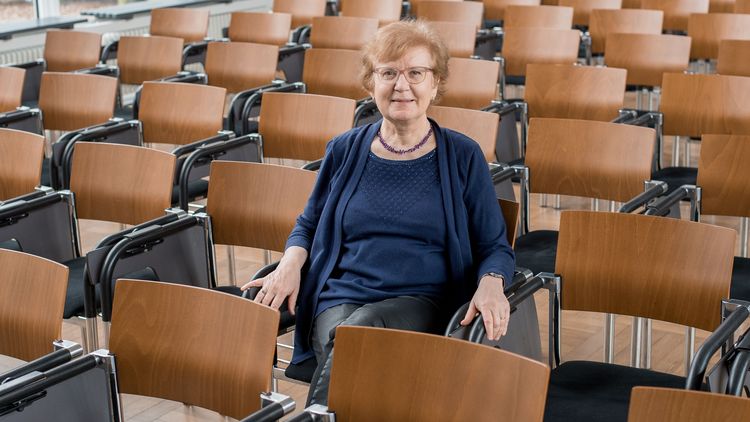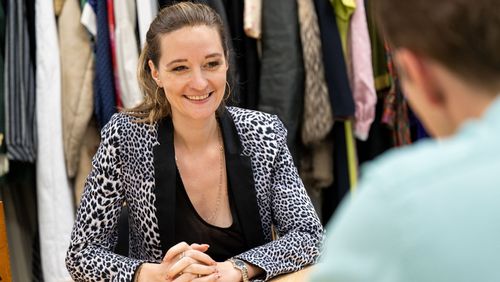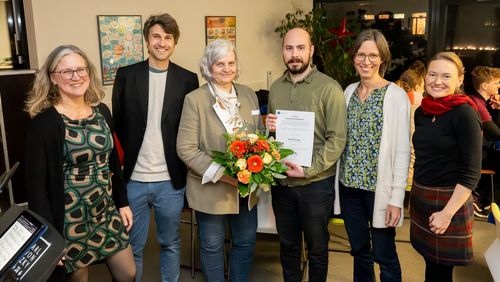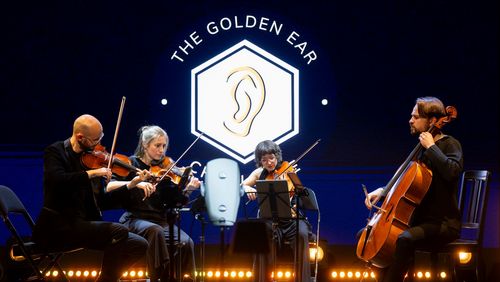Teaching, composing, organizing events – composer Violeta Dinescu has enriched musical life at the University of Oldenburg and far beyond for 25 years. Now she is retiring. An encounter in spring 2019.
A Monday morning in the winter semester. Prof. Violeta Dinescu walks through the corridors of the Institute of Music. Everyone she meets, student or teacher, receives a smile, a hug, a warm greeting. The composer has taught at the university for more than 20 years and her work has inspired several generations of young people.
Before coming to northern Germany, she taught mainly music theory and harmony at other universities in Heidelberg, Frankfurt and Bayreuth. When she was a student in Bucharest, she prepared other aspiring musicians for the entrance exam at the Ciprian Porumbescu Conservatory (now the National University of Music Bucharest). "Teaching is my passion – a valuable complement to my composing. Because composing is a solitary activity, and I'm a communicative person," explains Dinescu, who was born and grew up in Romania.
Dinescu was 29 years old when she first came to Germany for an award ceremony in 1982. She was supposed to stay for just three days, but she ended up staying for good, not least because the difficult political situation in her homeland made it hard for her to return. "I could barely speak any German at the time," she recalls. But she had always been enthusiastic about German musicology, and had first encounters with the language by reading specialist literature.
"I plan mathematically – but it sounds Romanian"
When she was still finding her footing in Germany, supported by the Heidelberg musicologist Prof. Dr. Ludwig Finscher, she had to take a language exam for which she needed to learn German within a very short period. She recalls with a chuckle how she mastered this challenge: "By reading Mario Simmel's novel 'Es muss nicht immer Kaviar sein' (It can't always be caviar) and watching lots of television."
The composer has long since become comfortable with the German language. She likes the fact that she can put the words together like building blocks: "This is good preparation for composing," she says with a wink. But when it comes to music, Dinescu still carries her homeland in her heart: "I have retained my musical basis," she notes. Thus, when she composes, she always falls back on traditional Romanian elements: "I plan mathematically – but it sounds Romanian."
And her approach has been successful: over the last decades she has won numerous prizes for her work, which encompasses instrumental music, choral literature, music for children, film music and operas. In 1996, Dinescu initiated the Archive for Eastern European Music – an extensive collection of music and musical writings from all over Eastern Europe. And since 2006 she and her colleague, the musicologist Roberto Reale, have organized the ZwischenZeiten symposium in what she describes as a "fruitful collaboration". With the symposium they aim among other things to connect the musical worlds of Western and Southeastern Europe.
"The students must find their own way"
Mathematics plays a special role in Dinescu's work. For her, the world of numbers is a world of truths, she says. She is fascinated by the logic that closer scrutiny of musical works such as those of Beethoven reveals, and constructs her own music according to logical principles. But the sound is no less important, Dinescu stresses: "I don't use all tones, as was common in the 20th century, but work with tonal centres. With this approach I aim to achieve a sound range that is authentic."
Dinescu's eyes sparkle whenever she talks about her work. Her conversation is peppered with anecdotes – about the students learning to compose in her classes, about friends for whom she has composed, and about other artists from whom she has drawn inspiration. "Authentic" is a word she uses frequently. Because what she most wants to convey to her students is that "good composition teaching is that which encourages young people to do authentically what they feel inside." As she clarifies: "I don't want to tell them what to do. I want them to find their own way."
A fantastic way to meet people
Even so, composing also involves important aspects of craftsmanship, she stresses – every bit the university lecturer in this respect. For although it is true, she admits, that these days computers make it easy to generate electronic sounds and create complex structures, "you still have to experience for yourself how to play an instrument." Because only those who are truly acquainted with the acoustic peculiarities of, say, a piano or a string instrument are able to compose for them. "Some pieces look easy, but in fact they are almost impossible to play because they don't do justice to the instrument." It is at the end of the semester, when the budding musicians present their works at the Composers' Colloquium – generally with much pride and joy – that Dinescu sees whether her students have truly found their own way under her guidance.
The weekly colloquium series which the composer organizes together with Roberto Reale has been another huge success. Since 2006, composers, musicians, musicologists, philosophers and scientists have presented their works to the public at these events. "The colloquiums met with a positive response right from the start, and they're also a fantastic way to meet people," Dinescu points out. They allow her to bring speakers from all over the world to Oldenburg, and nowadays they practically run themselves, she says. "In the beginning, it was my acquaintances and friends who came, then they told their acquaintances and friends. For years now, I have no longer had to ask: Would you like to come? The colloquia are all booked until the summer semester of 2021, when I retire."
Author: Constanze Böttcher






